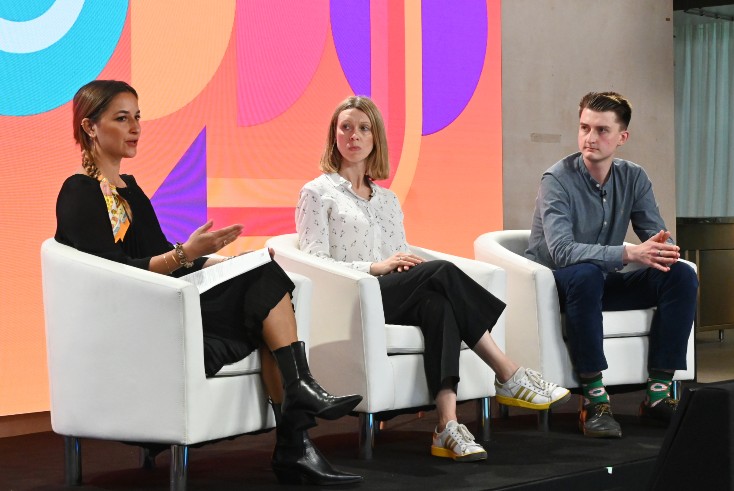‘Culture shift needed’: talent sounds alarm over climate inaction

“They don’t feel like their voices are being heard.”
While just under half (48%) of workers in media and advertising believe the industry has a “very” or “fairly” negative impact on climate change, a quarter said they would not feel comfortable voicing concerns to colleagues about a client’s impact on the environment.
That is according to a survey conducted by the Institute of Practitioners in Advertising (IPA) in partnership with market research company Ipsos unveiled at last week’s Advertising Week Europe conference in London.
According to the survey, more than half of respondents from IPA agencies (53%) said they feel anxious about climate change, with over one-third (37%) feeling “demoralised”. These figures are significantly higher than for the general public (37% anxious; 14% demoralised), including younger people who are more likely than the general people to report being concerned about the climate crisis.
Ipsos ESG Practice consultant Fran Soares, who presented the findings, described it as “quite worrying” that workers in the ad industry are so demoralised about the climate crisis.
When asked “Is the [Advertising industry/your company] doing enough to address climate change?” almost half of ad agency respondents (49%) said their company was doing too little, while 70% said the industry was doing too little.
Tension of working to grow consumption
Soares expressed a “culture shift” needs to happen within agencies to better address especially younger employees’ concerns around the climate crisis.
She said it’s clear young people who are especially passionate about climate change do not feel they are being given the opportunity to share their thoughts with senior leadership, leading to negative attitudes about their role in their workplace and in society more broadly. Soares suggested agency leaders should seek ways to “give people a voice” and make their climate anxieties heard.
Pauline Robson, managing partner and head of sustainability at WPP agency EssenceMediacom noted that many advertising employees struggle ethically when considering the impact of their work drives increased consumption.
“I think what we’re seeing here is that for a lot of people working in the industry, they have a real tension,” she said. “Which is, our industry exists to drive growth for our clients, to drive consumption for our clients’ [goods]. When you’re holding that reality of what’s happening in the climate crisis, it’s a very difficult edge to be at.”
Big Tech is going green, so let’s help the whole industry do the same
Soares added that conversations around sustainability often happen at agencies between younger employees with fresh ideas, as well as at the top level among leadership where decisions are made, but that “there’s no really a connection” between the two groups. “[Young employees] are not bringing the ideas up to senior leadership, which might be the reason why they don’t feel heard.”
Robson challenged the industry to answer the question of how it can allow people to turn their “depth of feeling” about climate into positive action in their day-to-day roles.
She continued: “Yes, it’s a challenge, but there’s a real opportunity here to give people opportunity to get involved in initiatives where they solve problems using sustainability as a way to drive innovation with new ideas and approaches for clients.”
Changing priorities
While Robson described the survey results as concerning, she noted it also found that people outside the ad industry did not hold nearly as negative an opinion of it as it relates to sustainability. For example, among young people, 53% of survey respondents said they would consider working in the advertising industry. Further, 26% of young adults said they believe the ad industry has a positive impact on climate change compared to 17% that said it has a negative impact — a sharp distinction compared to respondents from within the industry.
Rob McLaren, an insight executive at independent media agency the7stars, suggested the reason for the difference is that while young people care about the climate, it is not a “primary concern” among young job-seekers. In a competitive job market like today, he said, young people prioritise job security and salary over any concerns around the environment.
Soares agreed, noting that young people don’t feel they can “afford to be picky” when choosing a job.
The discrepancy in the survey results can thus be explained by priorities shifting once individuals have a few years under their belt in the industry and feel more settled in their roles. Then, suggested McLaren, do they start to more critically question media’s role in the climate crisis and their personal impact. This can lead to concerns around retention if employees do not feel they are doing socially good work.
Breaking the ‘climate bubble’
Soares noted that, despite the negative sentiment expressed in survey results, the industry has begun making progress on sustainability, such as through Ad Net Zero efforts.
“There is a lot that’s already happening,” replied Robson. “There’s always more we can be doing. We need to be doing more and we need to be doing it faster.”
She added: “We have a bit of a challenge in the industry, actually. There is a bit of a climate bubble, a group of people in the industry that are really passionate about this who are very engaged with it […] but we’re finding it very hard to break out of the people who are already [here].”
The good news is, as McLaren noted, young people do not view the industry so negatively, and new job-seekers can and should be recruited to help bring with them a culture of change.
He suggested: “It starts with directing people into the industry that are passionate about this.”



